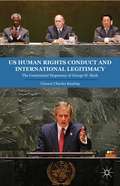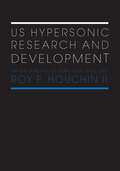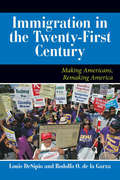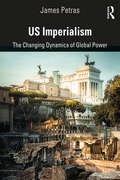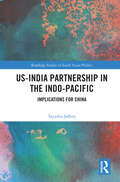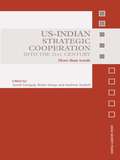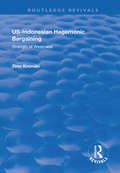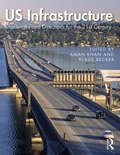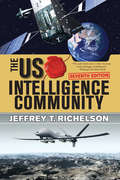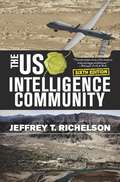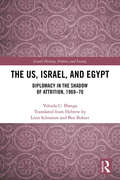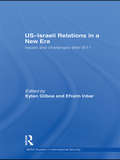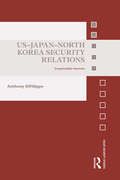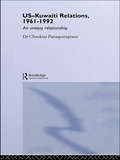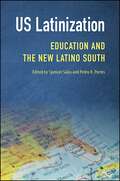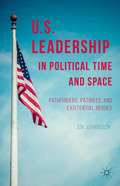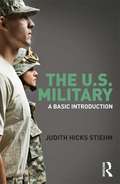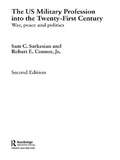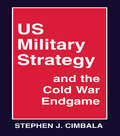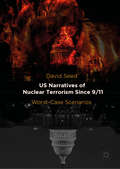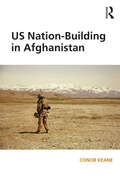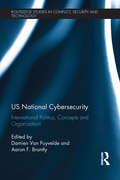- Table View
- List View
US Human Rights Conduct and International Legitimacy
by Vincent Charles KeatingWas the Bush administration was successful in legitimating its preferences with habeas corpus, torture, and extraordinary rendition? As American transforms in the post-Bush era, scholars have begun to assess the post-9/11 period in American foreign and domestic policy, asking difficult questions regarding torture and human rights.
US Hypersonic Research and Development: The Rise and Fall of 'Dyna-Soar', 1944-1963 (Space Power and Politics)
by Roy F. Houchin IIAn essential new account of some of the most valuable research and development in international military history. Roy F. Houchin II shows how the roots of US Air Force hypersonic research and development are grounded in Army Air Force General Henry H. 'Hap' Arnold's identification of the need for advanced airpower weapon systems to meet the anticipated postwar enemy threat. The technology for a smooth transition to military spaceflight seemed within reach when Bell Aircraft Corporation executive Walter Dornberger (the former commander of Nazi Germany's V-2 rocket research) made an unsolicited proposal to William E. Lamar (the chief of Wright Aeronautical Development Center's New Development Office of the Bomber Aircraft Division at Wright-Patterson AFB, OH) for a hypersonic boost-glide weapon system. Visionaries like Arnold, Dornberger, and Lamar believed a hypersonic boost-glider would represent the ultimate expression of the US Air Force's doctrine by performing strategic bombardment and reconnaissance more successfully any other type of vehicle. As this aspiration reached maturity in Dyna-Soar, the service's leadership never gave up their beliefs. This book shows how the struggle to persuade the secretary of defence and his advisors, who did not share the Air Force's vision for a military spaceplane, illustrates the ebb and flow of an advanced technology program and its powerful legacy within American society.
US Immigration in the Twenty-First Century
by Louis Desipio Rodolfo O. de la GarzaImmigration in the Twenty-First Century is a comprehensive examination of the enduring issues surrounding immigration and immigrants in the United States, beginning with a look at the history of immigration policy, followed by an examination of the legislative and legal debates waged over immigration and settlement policies today and concluding with a consideration of the continuing challenges of achieving immigration reform in the United States. The authors also discuss the issues facing immigrants in the United States, from the reception of immigrants within the native population to the relationship between minorities and immigrants. Immigration and immigration policy continues to be a hot topic on the campaign trail, and in all branches of federal and state government. U. S. Immigrants and Immigration Policies in the Twenty-First Century provides students with the tools and context they need to understand these complex issues.
US Imperialism: The Changing Dynamics of Global Power (Studies In Critical Social Sciences / Critical Global Studies #83/6)
by James PetrasThis book offers a broad and deep examination of the dynamics of US imperialism. Petras analyzes imperialism not only as economic domination, showing that its impact in the world takes many forms, including cultural, political and historical. He points to the disruptive effects it has on other world regional economies and cultures. Capitalism and imperialism take diverse forms but both are intimately tied to the projection of state power in the service of capital—a strategy designed to advance the geopolitical and economic interests of the US economic elite and ruling class—interests that are equated with the 'US national interest'.
US-India Partnership in the Indo-Pacific: Implications for China (Routledge Studies in South Asian Politics)
by null Tayyaba JafferyThis book discusses the partnership between the US and India in the Indo-Pacific region, which also serves as an engine for the Quad alliance of the US, India, Japan, and Australia. It investigates the multilateral efforts taken by the Quad and its effects on changing, reforming, or establishing a new regional security complex against China in the Indo-Pacific.The theory employed by the author is based on a novel construct of Heterarchical Regional Security Complex (HRSC), which refers to a de-centralized principle of power distribution; that is, power is not concentrated in a particular element but rather diffused within the entire structure. When merged with the Regional Security Complex (RSC) Theory, it presumes the creation of such a security complex in which all members have roughly equal power. This book unravels how the Quad can operate as an HRSC in balancing against China’s growing hold in the region. It is supplemented by the Balance of Threat framework to discuss the functioning of Quad from a minilateral perspective with a heterarchical overlay. Besides Quad, this book also focuses on the blooming partnership between the US and India since the turn of the century (2007–2020).This book will be beneficial for researchers interested in international relations, Asian politics, regional security, and Indo-Pacific studies.
US-Indian Strategic Cooperation into the 21st Century: More than Words (Asian Security Studies)
by Sumit Ganguly Brian Shoup Andrew ScobellIn this edited book, leading scholars and analysts trace the origins, evolution and the current state of Indo-US strategic cooperation. During the Cold War, owing to opposing grand strategies, the two states frequently found themselves at odds. With the end of the Cold War and the demise of the Soviet Union, Indo-US security cooperation started in a fitful fashion, but in recent years it has acquired considerable stability. The armed forces of the two states have participated in exercises on land, sea and air and have also carried out joint humanitarian missions. Drawing on new information and with contributions from both academics and policy makers, this wide-ranging volume analyzes the strategic convergence of the world’s two largest democracies, whilst explaining why important differences do remain. These notably include questions pertaining to the future of India’s nuclear and ballistic missile programs, US-Pakistan ties and India’s links with Iran. This volume will be of great interest to students of South Asian politics, Asian security, US foreign policy and security studies in general.
US-Indonesian Hegemonic Bargaining: Strength of Weakness
by Timo KivimäkiTitle first published in 2003. Following the terrorist attacks of September 11, 2001 and October 12, 2002 in the United States and on Bali, we may be witnessing the most sweeping shift in US foreign policy since the beginning of the cold war. America is again committed to leading the world in a battle against a global enemy. The US relationship with Indonesia - the country with the world’s largest Islamic population - could prove to be of decisive importance for the success of its new global mission. Timo Kivimäki’s analysis of the dynamics and background of the US-Indonesian relationship will be essential reading for all concerned with American Foreign Policy, Asian studies, peace studies and conflict resolution and negotiation.
US Infrastructure: Challenges and Directions for the 21st Century
by Aman Khan Klaus G. BeckerThis book presents an in-depth look at US infrastructure and its challenges in the 21st century. While infrastructure has received considerable attention in recent years, much of the discussion has concentrated on physical, economic, or noneconomic conditions. The Trump administration has heightened interest in the topic, promising infrastructure spending during his tenure, yet little demonstrable progress has been made. This book brings together a multi-disciplinary perspective—structural, technological, economic, financial, political, planning, and policy—that has been largely absent in discussions on the subject, to provide a clearer and broader understanding of the challenges facing US infrastructure. The book is divided into three parts: Part I looks at the challenges from a structural, technological, and sustainability perspective; Part II from an economic, productivity, and finance perspective; and Part III from an institutional, security, and political perspective. Written primarily for policy makers, managers, and administrators in public and private organizations, as well as individuals and academics with an interest in the future of US infrastructure, this book provides an in-depth analysis of the US infrastructure problem, its causes and consequences, and suggests timely, specific measures that may be taken at the state, local, and federal levels to improve and better secure our roads, transit, public buildings, economy, and technology.
The US Intelligence Community
by Jeffrey T. RichelsonThe sixth edition of this comprehensive overview of the United States intelligence apparatus is updated to reflect changes in organizational structures and processes as well as to take advantage of the latest publicly available sources on intelligence organizations, management and methods. Beginning with an introduction on basic intelligence principles, the volume covers national intelligence organizations, Defense Department intelligence and the DIA, service branch intelligence organizations, civilian organizations, imagery, image processing and signals intelligence, space surveillance, human intelligence assets, cooperation with foreign services, analysis, counterintelligence, covert action, national intelligence community management, Defense Intelligence management and managing intelligence collections, covert action and information access. The work includes black and white photographs, sample documents and organizations charts as well as an essential glossary of acronyms. Richelson is a senior fellow at the National Security Archive in Washington D. C. Annotation ©2011 Book News, Inc. , Portland, OR (booknews. com)
The US Intelligence Community
by Jeffrey T. RichelsonThe role of intelligence in US government operations has changed dramatically and is now more critical than ever to domestic security and foreign policy. This authoritative and highly researched book provides a detailed overview of America’s vast intelligence empire--its organizations, its operations (from spies on the ground to satellites thousands of miles in space), and its management structure. Relying on a multitude of sources, including hundreds of official documents, author Jeffrey T. Richelson provides an up-to-date picture that will allow students to understand the full scope of the US intelligence community’s organizations and activities and give valuable support to policymakers and military operations. Fully revised throughout, the sixth edition of this definitive text includes new material on intelligence organization, foreign and domestic intelligence collection and analysis, covert action, and cooperation with foreign intelligence services.
The US Intelligence Community
by Jeffrey T RichelsonThe role of intelligence in U.S. government operations has changed dramatically and is now more critical than ever to domestic security and foreign policy. This authoritative and highly researched book provides a detailed overview of America's vast intelligence empire--its organizations, its operations (from spies on the ground to satellites thousands of miles in space), and its management structure.Relying on a multitude of sources, including hundreds of official documents, author Jeffrey T. Richelson provides an up-to-date picture of the U.S. intelligence community that will allow students to understand the full scope of organizations and activities and give valuable support to policymakers and military operations. Fully revised throughout, the sixth edition of this definitive book includes new material on intelligence organization, foreign and domestic intelligence collection and analysis, covert action, and cooperation with foreign intelligence services.
The US, Israel, and Egypt: Diplomacy in the Shadow of Attrition, 1969-70 (Israeli History, Politics and Society)
by Yehuda U. BlangaThis book deals with the diplomatic triangle of Israel, the United States, and Egypt during the War of Attrition along the Suez Canal in 1969–1970. Considering the Egyptian president’s political positions and outlooks on the Arab-Israeli conflict and the pan-Arab sphere, relations with the United States, the study reviews the internal disagreements between the State Department and Henry Kissinger, the national security adviser in the White House. The study demonstrates that the United States and Egypt worked together to thaw their relations after the severance of ties in June 1967, motivated by a desire to protect and advance their interests in the Middle East. The book is based chiefly on textual analysis of political and historical events in the domain of international relations, but with the same attention to internal policy as well. In addition, the research draws chiefly on primary sources that have only recently been released to the general public and that have not yet been the subject of serious analysis. The lion’s share of the work is based on qualitative content analysis of documents from the National Archives in Washington and especially of the US State Department. Providing a reading that is new, comprehensive, and complete, both with regard to the scope of the sources as well as the analysis of developments in the relations between Egypt and the United States, this book is a key resource for students and scholars interested in the Arab-Israeli conflict, political science and diplomacy, Israeli studies and the Middle East.
US-Israeli Relations in a New Era: Issues and Challenges after 9/11
by Eytan Gilboa Efraim InbarThis book examines in depth the fundamental problems, factors and issues in current US-Israeli relations, which will have implications both for the Middle East and for world peace and prosperity. The US and Israel have established an exceptional relationship, which has significant effects on events and processes in the entire Middle East. Israel depends on the US for military hardware, for support against hostile international organizations, and for economic and financial aid. In turn, it is viewed by the US as a strong and reliable ally, and the US has adopted strategic concepts that for decades have governed Israel's national security, such as pre-emptive strikes and counter-terrorist strategies. However, politicians and scholars have accused Israel and pro-Israeli organizations of exerting too much influence on US policy in the Middle East. Here, a collection of international experts present original research and findings on a wide variety of critical bilateral and regional issues in American-Israeli relations, approaching the topics from both theoretical and practical angles.
The US-Japan Alliance: Balancing Soft and Hard Power in East Asia (Nissan Institute/Routledge Japanese Studies)
by Tsuneo Akaha David AraseJapan's use of Soft power in its international politics is as yet understudied. Soft power presents as many challenges as promises. This book explores the way Japan uses soft power in its relationship with the US, its Asian neighbours and Europe and aims to contribute to a deeper understanding of the role of soft power in international relations. Hard power, on the other hand, is more tangible and has received far greater scholarly scrutiny than soft power. However, as this collection makes clear, hard power has its limitations and counterproductive consequences as an instrument of policy. This book makes it clear that hard power alone will not provide Japan with the peace and security it desires. A smart balancing or mixture of hard and soft power is required. Is Japan up to this challenge? While this book cannot give a definitive answer to this question, the excellent line-up of contributors present their best analyses of the effectiveness of Japan's current attempt at balancing the two components of national power in meeting its bilateral and multilateral security challenges. The US-Japan Alliance is suitable for upper undergraduates, postgraduates and academics in International Politics, Political Science, Security studies and Japanese studies. Winner of The Masayoshi Ohira Memorial Special Prize, 2011.
US-Japan-North Korea Security Relations: Irrepressible Interests (Asian Security Studies)
by Anthony DiFilippoThis book examines the major security and related issues between the United States, Japan and North Korea (officially, the Democratic People’s Republic of Korea - DPRK). Although focusing mainly on current issues, this book also provides sufficient historical background to enable readers to appreciate the many nuances that have been ignored by policymakers, analysts and the media. Where appropriate, the book examines the security interests of other nations in Northeast Asia, specifically South Korea, China and Russia. The central purpose of the book is to objectively analyze the policymaking processes of Washington, Tokyo and Pyongyang with respect to the DPRK's nuclear weapons and other important security issues, and ultimately to provide practical ways to improve the security environment in Northeast Asia. Ongoing security-related issues include nuclear missile testing by the DPRK; its removal from the U.S. list of states sponsoring terrorism, and the abduction of Japanese nationals by North Korean agents that occurred during the 1970s and 1980s. Unlike other books, which typically take the position that North Korea is a rogue state run by an irrational, belligerent and autocratic leader, this book reveals the fundamentals of Pyongyang’s security concerns in the region. This book will be of great interest to students of North East Asian politics, Asian security studies, US foreign policy and Security Studies/IR in general.
US-Kuwaiti Relations, 1961-1992: An Uneasy Relationship
by Chookiat PanaspornprasitAfter being granted full independence in 1961, Kuwait began its tumultuous relationship with the US. This book sets out to investigate this alliance within the frameworks of a ‘small state’ and ‘influence’, and in particular under the US presidents Carter, Reagan, and Bush. The political, diplomatic and military aspects are examined which have both stalled and enhanced the bilateral relationship at different times and events. The relationship between the two countries has not always been a straightforward one. Kuwait, overshadowed by its bigger neighbour Saudi Arabia, was regarded as a derivative interest by the US and its role within the region more often than not underestimated. Shedding new light on this key political alliance, the book details how this uneasy relationship evolved while Kuwait maintained its independent foreign policy, which contradicted US national interest. Illuminating and informative, it is essential reading for anyone with an interest in Middle East politics and international relations.
US Latinization: Education and the New Latino South
by Spencer Salas; Pedro R. PortesOffering a much-needed dialogue about Latino demographic change in the United States and its intersections with P–20 education, US Latinization provides discussions that help move beyond the outdated idea that Mexican and Spanish (language) are synonyms. This nativist logic has caused "Mexican rooms" to re-emerge in the form of English to Speakers of Other Languages (ESOL) transitional programs, tagging Latinos as "Limited English Proficient" in ways that contribute to persisting educational gaps. Spencer Salas and Petro R. Portes bring together voices that address the social and geographical nature of achievement and that serve as a theoretical or methodological resource for educational leaders and policy makers committed to access, equity, and educational excellence.
Us Leadership In Political Time And Space
by Jon JohanssonSpanning the history of American leadership, the book examines all facets of American thought leaders and innovators along with the models of ethics and courage they've provided for the American consciousness. From Thomas Paine to Rosa Parks, the book provides a multi-faceted approach to American leadership studies.
The US Military: A Basic Introduction (Cass Military Studies)
by Judith Hicks StiehmThis book provides a basic guide to the US military and will raise questions for further discussion by students and other curious readers. The US Military provides an accessible starting-point for those with a limited knowledge of this institution. Covering a wide range of subject matter, and ending with an extensive list of suggested resources to aid individual study and research, the text is divided into the following chapters: The A, B, Cs Strategy and Doctrine The Military in Action Weapons and Capabilities The Budget This book will be of great interest to students of the US military, US politics, defense studies, and war and conflict studies, and will also be of relevance to journalists, NGO staff and diplomats.
US Military Innovation since the Cold War: Creation Without Destruction (Strategy and History)
by Harvey Sapolsky Benjamin Friedman Brendan GreenThis book explains how the US military reacted to the 'Revolution in Military Affairs' (RMA), and failed to innovate its organization or doctrine to match the technological breakthroughs it brought about. Many called for the transformation of the US military in the years after the end of the Cold War, seeking the changes in organization and doctrine that would complete the RMA innovation and a commitment to counter-insurgency, peace keeping and nation building missions. This volume describes the origins, uses, and limits of the RMA technologies, examines how each of the five US armed services (categorising the Special Operations as a separate service) made their adjustments both to the technologies and the use of force, and how the role of the civilian officials and the defense industry altered in this process of change and avoidance of change. The book examines the internal politics of the services as well as civil/military relations to identify the external pressures on the services for significant change in their doctrine and weapons. Many have noted the failure of the services to innovate in what can be called the 'Second Inter-war Period' (the years after the Cold War). This book offers explanations for this failure and arguments about the possible range and desirability of military innovation in the post-Cold war era. This book will be of great interest to students of strategic studies, US defence politics, military studies, and US politics. Harvey M. Sapolsky is Professor of Public Policy and Organization in the Department of Political Science at MIT and former Director of the Security Studies Program. Benjamin H. Friedman is a Research Fellow in Defense and Homeland Security Studies at the Cato Institute and a Ph.D. Candidate in Political Science at MIT. Brendan Green is a Ph.D. Candidate in Political Science at MIT and an affiliate of the Security Studies Program.
The US Military Profession into the 21st Century: War, Peace and Politics (Cass Military Studies)
by Sam Sarkesian Robert ConnorThis brand new edition of The US Military Profession into the Twenty-First Century re-examines the challenges faced by the military profession in the aftermath of the international terrorist attack on the United States on September 11, 2001. While many of the issues facing the military profession examined in the first edition remain, the 'new war' and international terrorism have compounded the challenges. The US military must respond to the changed domestic and strategic landscapes without diminishing its primary function—a function that now many see that goes beyond success on the battlefield. Not only has this complicated the problem of reconciling the military professional ethos and raison d’etre with civilian control in a democracy, it challenges traditional military professionalism. This book also studies the notion of a US military stretched thin and relying more heavily on the US Federal Reserves and National Guard. These developments make the US military profession increasingly linked to public attitudes and political perspectives. In sum, the challenge faced by the US military profession can be termed a dual dilemma. It must respond effectively to the twenty-first century strategic landscape while undergoing the revolution in military affairs and transformation. At the same time, the military profession must insure that it remains compatible with civilian cultures and the US political-social system without eroding its primary function. This is an invaluable book for all students with an interest in the US Military, and of strategic studies and military history in general.
US Military Strategy and the Cold War Endgame
by Stephen J. CimbalaAt the end of the Cold War security concerns are more about regional and civil conflicts than nuclear or Eurasian global wars. Stephen Cimbala argues that deterrence characteristics of the pre-Cold War period will in the 21st century again become normative.
US Narratives of Nuclear Terrorism Since 9/11: Worst-Case Scenarios
by David SeedThis study examines the US fiction and related films which makes a series of interventions in the cultural debate over the threat of nuclear terrorism. It traces the beginnings of this anxiety from the 1970s, which increased during the 1990s after the collapse of the Soviet Union. The traumatic events of 9/11 became a major reference point for this fiction, which expressed the fear that of a second and worse 9/11. The study examines narratives of conspiracies which are detected and forestalled, and of others which lead to the worst of all outcomes – nuclear detonations, sometimes delivered by suitcase nukes. In some of these narratives the very fate of the nation hangs in the balance in the face of nuclear apocalypse. The discussion considers cases of attacks by electromagnetic pulse (EMP), cyberterrorism and even bioterrorism. Some of the authors examined are present or former politicians, members of the CIA, and former president, Bill Clinton.
US Nation-Building in Afghanistan (Open Access)
by Conor KeaneWhy has the US so dramatically failed in Afghanistan since 2001? Dominant explanations have ignored the bureaucratic divisions and personality conflicts inside the US state. This book rectifies this weakness in commentary on Afghanistan by exploring the significant role of these divisions in the US’s difficulties in the country that meant the battle was virtually lost before it even began. The main objective of the book is to deepen readers understanding of the impact of bureaucratic politics on nation-building in Afghanistan, focusing primarily on the Bush Administration. It rejects the ’rational actor’ model, according to which the US functions as a coherent, monolithic agent. Instead, internal divisions within the foreign policy bureaucracy are explored, to build up a picture of the internal tensions and contradictions that bedevilled US nation-building efforts. The book also contributes to the vexed issue of whether or not the US should engage in nation-building at all, and if so under what conditions.
US National Cybersecurity: International Politics, Concepts and Organization (Routledge Studies in Conflict, Security and Technology)
by Damien Van Puyvelde Aaron BrantlyThis volume explores the contemporary challenges to US national cybersecurity. Taking stock of the field, it features contributions by leading experts working at the intersection between academia and government and offers a unique overview of some of the latest debates about national cybersecurity. These contributions showcase the diversity of approaches and issues shaping contemporary understandings of cybersecurity in the West, such as deterrence and governance, cyber intelligence and big data, international cooperation, and public–private collaboration. The volume’s main contribution lies in its effort to settle the field around three main themes exploring the international politics, concepts, and organization of contemporary cybersecurity from a US perspective. Related to these themes, this volume pinpoints three pressing challenges US decision makers and their allies currently face as they attempt to govern cyberspace: maintaining international order, solving conceptual puzzles to harness the modern information environment, and coordinating the efforts of diverse partners. The volume will be of much interest to students of cybersecurity, defense studies, strategic studies, security studies, and IR in general.
